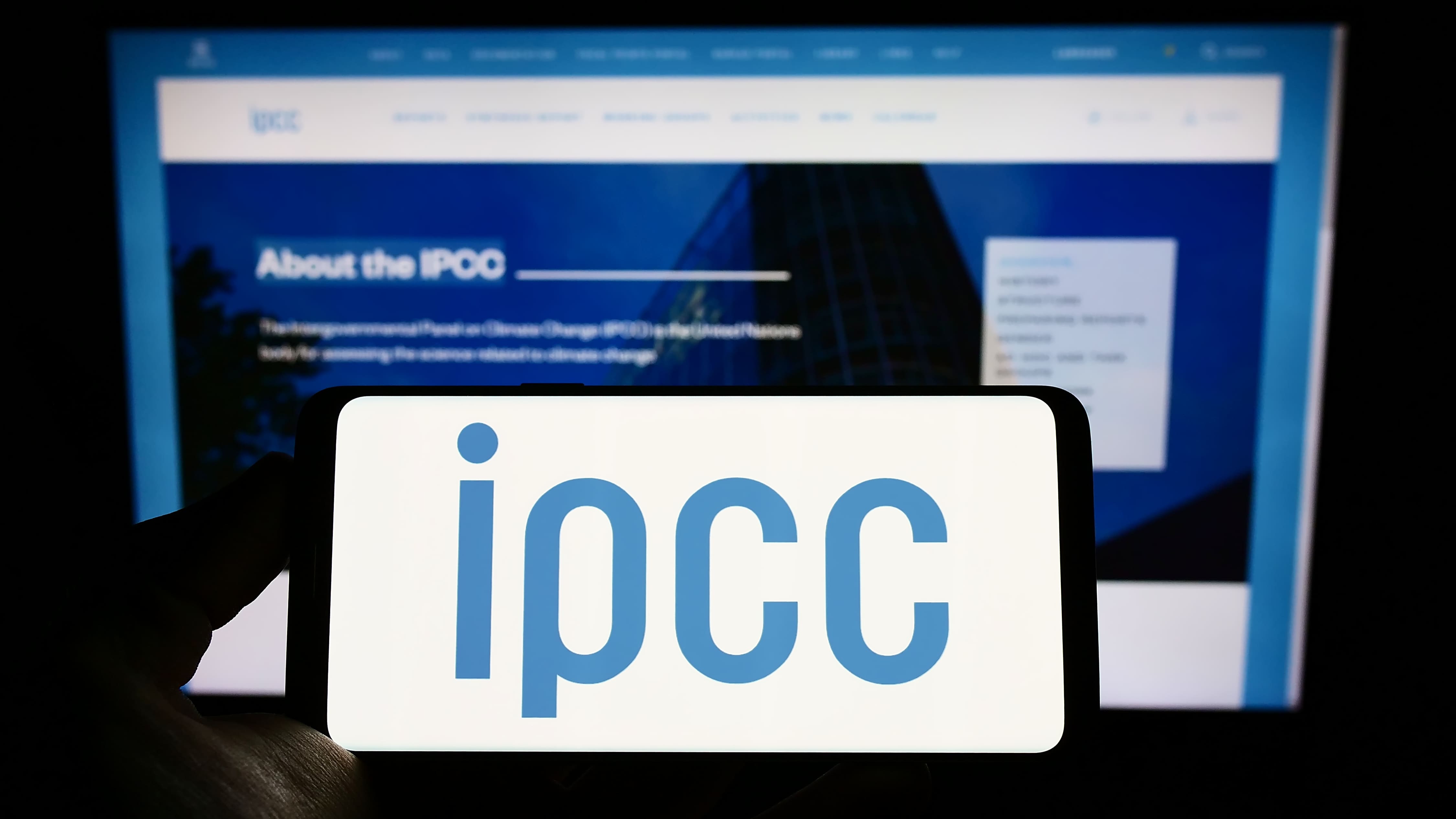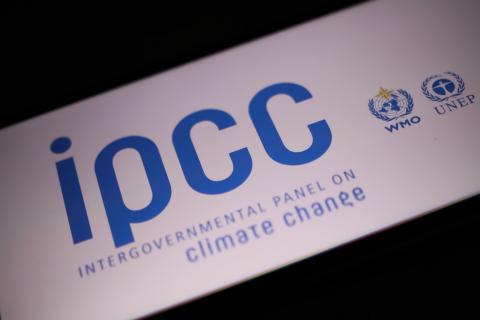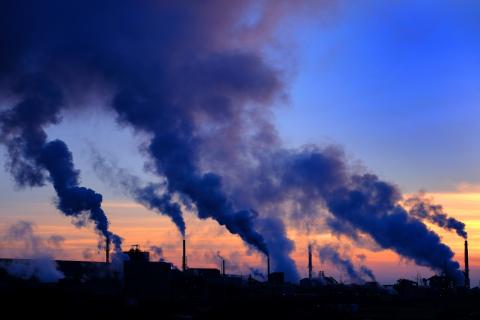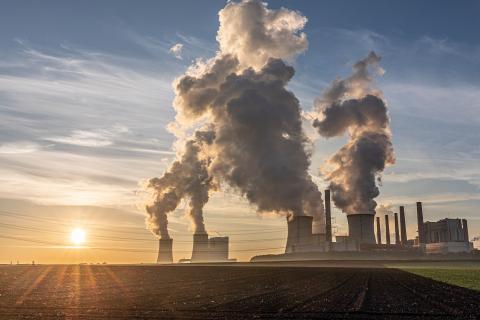Reactions to the IPCC synthesis report urging more ambitious action to combat climate change
Almost a decade after the previous edition, the Intergovernmental Panel on Climate Change (IPCC) has presented the synthesis report of its sixth assessment cycle (AR6) on Monday in Switzerland. "This synthesis report underlines the urgency of taking more ambitious action and demonstrates that, if we act now, we can still secure a sustainable and liveable future for all," said IPCC chair Hoesung Lee.
The document includes the main findings of the three Working Group reports of 2021 and 2022 (Physical basis, Impacts, adaptation and vulnerability and Mitigation of climate change) and the three special reports of 2018 and 2019 (Global warming of 1.5°C, Climate change and land, Ocean and cryosphere in a changing climate). With this document, which is primarily addressed to policy makers, the IPCC closes its sixth assessment cycle.

Adobe Stock.
Pep Canadell - informe de síntesis IPCC EN
Pep Canadell
Executive Director of the Global Carbon Project and Senior Research Fellow at the CSIRO Climate Science Centre in Canberra, Australia
One of the most important points to highlight from this new report is the fact that the benefits associated with decarbonising the global economy are as great or greater than the cost of inaction and thus of unmitigated climate impacts. This demonstrates that the health benefits due to reduced pollution, increased energy independence of countries and the development of a more equal, smarter and more energy and material efficient society are reasons that add to the urgent need for a rapid decarbonisation of the economy.
In the last two years, when the IPCC has published the reports of this latest assessment cycle, the burning of fossil fuels and deforestation are responsible for more than 90 billion tonnes of carbon dioxide emissions, the most important gas in climate change. Even more worryingly, fossil fuel emissions continue to grow. Clearly, the world's governments are not keeping their word to reduce emissions as the IPCC science indicates.
"I was coordinating lead author of the WGI (Working Group I), but I have not been involved in this synthesis report".
Tania Guillén - informe síntesis IPCC EN
Tania Guillén Bolaños
Researcher at the Climate Service Center Germany (GERICS)
With the Synthesis Report (SYR), the IPCC completed the sixth most productive assessment cycle in its history, consisting of three special reports, a methodology update and contributions from the three working groups. These reports present the state of the art on the science of climate change, including its impacts on society and ecosystems. The synthesis report, as its name implies, summarises the main findings of this assessment cycle. The information presented by the IPCC gives us a better understanding of how the climate has changed, the effects of those changes and the solutions available to address the negative consequences.
The IPCC confirms once again that, as humanity, we are responsible for the observed global warming and that not all countries have contributed equally to the problem. Furthermore, the report confirms the findings of the previous report on 1.5°C of global warming, published in 2018, as it states that it is still possible to limit global warming, and thus the projected risks and impacts, to 1.5°C compared to the pre-industrial era. However, current trends are not compatible with a sustainable and equitable planet for its inhabitants and ecosystems. The challenge is growing.
1.5°C is the most ambitious limit of the Paris Agreement and also the limit that poses the least risk to humanity and the ecosystems that inhabit it. However, the window of opportunity we have as humanity is closing. Rapid, deep and, in most cases, immediate reductions in greenhouse gas emissions in all sectors this decade are needed to limit warming by 1.5°C.
The IPCC assessment tells us once again that we can no longer delay climate action. The longer we delay, the less feasible adaptation measures become (those that are feasible now may not be feasible in a warmer future). The greater the warming, the greater the losses and damages, especially in already vulnerable communities and regions. This assessment cycle has emphasised vital aspects of the interconnectedness between climate, ecosystems, biodiversity and society (including equity and justice). Everything is connected: we need climate-resilient development.
There is sufficient technology and funding for the implementation of actions to adapt to observed and projected changes, as well as for actions to mitigate climate change. It is not a lack of resources, but barriers to allocating resources for climate action that also contributes to a just sustainable future.
While IPCC reports are not prescriptive, they are highly relevant for global policy, especially for negotiations under the United Nations Framework Convention on Climate Change. Current climate policies (NDCs) are not sufficient to limit warming according to the limits of the PA (Paris Agreement). So with this information, in the next round of climate change negotiations in the United Arab Emirates, governments must move from talk to action.
"I was a chapter scientist and contributing author (chapter 3), and part of the author team that drafted the summary for policymakers of the 1.5°C global warming report. In addition, I am an expert reviewer of the Working Group I report and an expert reviewer and contributing author of the Working Group II report".
Vanesa Castán - informe síntesis IPCC EN
Vanesa Castán Broto
Professor of Urban Climate Change at the University of Sheffield
The Synthesis Report concludes an enormous effort to examine current knowledge in the Intergovernmental Panel on Climate Change. Its value is integrating knowledge and examining the linkages across impacts, vulnerabilities, adaptation options and mitigation.
Some key findings cannot be stressed enough: The anthropogenic origin of climate change is now an undisputed fact. Near half of the world’s population is exposed to life-threatening impacts of climate change, and many have already suffered losses and damages. Climate change impacts are destroying life-supporting ecosystems and biodiversity. Every increment of global warming will exacerbate extremes and reduce humanity’s capacity to adapt because adaptation is facing limits: emissions must stop now. There is a wide range of options that work for adaptation and mitigation, so there is no excuse to start acting at all levels of governance. The main obstacle to action is finance. The gap between what is needed and what is mobilised in adaptation finance is shameful, particularly considering the finding stated in the Summary for Policy Makers that “there is sufficient global capital and liquidity to close global investment gaps.”
Reminding the world of these statements is essential, as they directly affect international negotiations, governmental policy, private sector investment, community organising and ultimately, the mobilisation of every possible effort to adapt to and mitigate climate change.
One of the key messages of the Synthesis Report is, precisely, the need to mobilise every effort from facilitating international cooperation, to implementing and following through governmental regulations, facilitating technological exchange in city and business networks, innovating in finance, and engaging communities that already lead place-based efforts to adapt to and mitigate climate change. There is an emphasis on ‘near-term action,’ that is, rapid and ambitious mitigation and adaptation that requires high upfront investments and may cause disruptive impacts on current societies -the diagram that should be given most attention is Figure 7 of the SPM (Figure 7), which describes many mitigation and adaptation options. Understanding the nature of those actions is a means to palliate disruptive impacts. Experiences in delivering just transition policies, for example, in regions dependent on coal mining, demonstrate that it is possible to put the needs of the vulnerable upfront in work towards delivering a shared low-carbon, climate-resilient future.
The report thus calls for putting climate justice and equity at the centre of climate action. The report emphasises a concept called ‘Climate resilient development.’ Climate resilient development is development that recognises the complex trade-offs between human flourishing, reduction of carbon emissions and the need to adapt to a changing environment. The issue is that climate-resilient development is not one thing, but many things, depending on the many perspectives of different groups within human societies. For that reason, the Summary for Policy Makers explains that “climate-resilient development is advanced when actors work in equitable, just and inclusive ways to reconcile divergent interests, values and worldviews toward equitable and just outcomes.” Reconciliation may not always be possible, but what is always possible is to build solidarities across contexts and across interests and continue listening to each other. We must collectively thank the IPCC for this report that brings diverse perspectives and modes of knowing into the most authoritative account of a world under change.
"I am an author of the IPCC but not of the synthesis report".
José Manuel Moreno -informe de síntesis IPCC EN
José Manuel Moreno
Professor of Ecology at the University of Castilla-La Mancha and member of the Academy of Social Sciences and Humanities of Castilla-La Mancha
Covid-19 has altered our lives in recent years, and so have the deadlines for the reports of the Intergovernmental Panel on Climate Change (better known as the IPCC). However, the Synthesis Report of the sixth assessment round of this body since its founding in 1988 not only lives up to its predecessors but presents us in a succinct, well-ordered and structured way that is easy to follow and understand, the comprehensiveness and interconnectedness of the main aspects that were contained independently in the three main reports of each of the working groups (WGs) (The Physical Bases of Climate [WG I], Impacts, Adaptation and Vulnerability [WG II], and Mitigation of Climate Change [WG III]). In addition, three special reports have been produced during this sixth assessment round: "Global Warming of 1.5 °C", conducted at the request of the Framework Convention on Climate Change following the Paris Agreement in 2015, which laid the groundwork for reorienting the objectives of that agreement to contemplate 1.5 °C, not just 2 °C, as a warming target; "Climate Change and the Earth", which studied the interactions between terrestrial ecosystems and climate; "Oceans and the Cryosphere in a Changing Climate", which analyses the interactions between these component of the Earth System on climate.
The Synthesis Report aims to synthesise in a comprehensive and coherent way what is contained in each of the above-mentioned reports. In doing so, it has made the following clear:
- the observed warming is unequivocal, with increasingly overwhelming evidence of it;
- the impact of this warming on ecosystems and human systems is also unequivocal;
- unprecedented action is needed to reduce emissions to levels consistent with not exceeding 1.5°C or 2°C warming.
These levels of warming were agreed at the Paris Conference in 2015. After analysing past trends and possible future changes, the report spends much of its time exploring possible ways to halt warming as agreed, detailing the mitigation options that exist in different industrial or natural sectors. It details how each increase in warming escalates the consequent hazards and impacts, hence the urgent need to act on mitigation, highlighting the benefits of doing so against the costs of inaction. The solution lies in climate-resilient development, which requires measures to adapt to the new climate, while reducing emissions and reaping the benefits of doing so. However, there are limits to adaptation, hence the urgency of halting warming at manageable levels. Natural ecosystems and society are interconnected; we need the former for future prosperity, hence the need to conserve 30-50% of them in order to ensure the health of the planet and enable sustainable development. On the other hand, climate justice is needed to guide action, as those who have done the least to create the problem are the ones who are most negatively affected by this overheating climate, which is not going to stop in the foreseeable future.
This report marks the end of the IPCC's sixth assessment cycle, and it is now up to governments to take note of its diagnosis of the situation and the options, not prescriptions, it contains to address the need to halt the use of fossil fuels, the main cause of global warming. Its conclusions have been endorsed by all member countries, which are the majority of countries represented at the UN. Never has science been so clear and robust in pointing out a problem, its origins and possibilities to reduce or minimise it. It is now up to all of us to act, first and foremost governments, who have the tools at their disposal to reverse a problem created by a way of conceiving the planet as infinite. But the Earth is finite and we must match what we do with its capacity to tolerate it and not alter it in such a way that development turns against us.
"I am part of the IPCC authoring team but not of the Synthesis Report".
Francisco J Doblas - informe síntesis IPCC EN
Francisco J. Doblas-Reyes
ICREA Professor, Director of the Earth Sciences Department at the Barcelona Supercomputing Center
The Synthesis Report leaves us with shattering evidence of the need to address adaptation to climate change and mitigation of human-induced emissions together. It highlights the fact that climate change is already taking place and is expressing itself in all regions of the planet in different ways, as would be expected on a planet that has warmed by more than one degree since pre-industrial times. At the same time, it makes it clear that the solution remains in the hands of global society, since both the speed of warming and the level reached by the end of the century depend above all on emissions from now on.
In any case, and taking into account the trajectory for the rest of the century and beyond, since the impact of warming will continue to be present in some variables such as sea level for many centuries, it is clear that the impacts depend fundamentally on accumulated emissions and that the only way to limit them is to reduce those emissions as fast as possible and at the fastest rate that society is able to assimilate in a systemic transformation. Until that happens, impacts will continue to grow due to the increased frequency and intensity of extreme weather events. This is important not only for the most vulnerable societies, such as economies in transition, but also for environments such as ours because the standards by which society and the economy are governed have not taken into account a changing climate.
We still have much to know about the behaviour of the climate system, how it reacts to the increase of greenhouse gases in the atmosphere or how the impacts of changes in climate on society, the economy and ecosystems will manifest themselves. But the report's conclusions about what we know now leave no doubt that it is time to act, and to do so in a way that is fair to the most vulnerable and to future generations.
"I did not participate in the preparation of the synthesis report. I was lead author of AR5 and coordinating lead author of AR6 (in group I in both cases)".
Eloy Sanz - informe síntesis IPCC EN
Eloy Sanz Pérez
PhD in Chemical Engineering, researcher in the high-performance research group in Chemical and Environmental Engineering at the Universidad Rey Juan Carlos.
This IPCC synthesis report reminds us that our greenhouse gas emissions (mainly CO2) are the unequivocal cause of the global warming that has led to global climate change. Today, we are already suffering from its impacts in many areas: extreme temperatures, droughts and floods, physical and mental health, agricultural production, etc. Paradoxically, the least developed countries have contributed the least to these effects, but they are suffering the most.
It is very likely that 1.5°C will be reached in the short term and some of the effects of climate change are already irreversible. It is therefore imperative to develop adaptation strategies, i.e. we must protect our streets, homes and ecosystems against impacts that will be with us forever.
Despite all this, we must be aware that the decisions we take today will determine the magnitude of tomorrow's effects and that it is essential to implement immediate, rapid and ambitious emission reductions. For this, we already have the necessary tools. Those with the greatest potential in each area are solar and wind technologies (energy), the conservation of natural ecosystems and regenerative agriculture (land use), as well as increased efficiency in buildings and transport (infrastructure), not forgetting electrification and changes in our diet.
"I have been involved as a reviewer in some of the reports that are used to do the synthesis but I have not been involved in the synthesis document itself".



